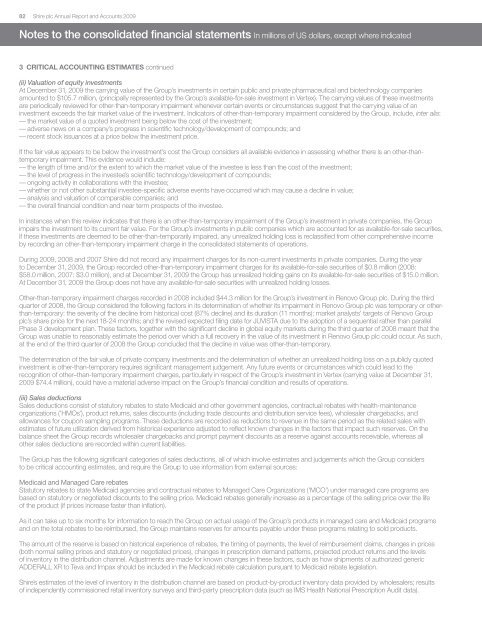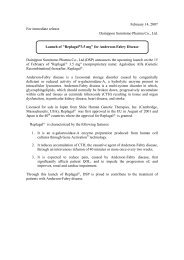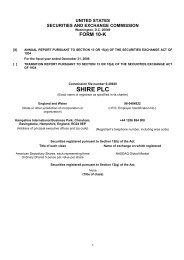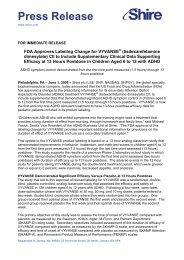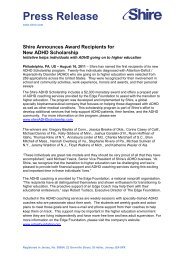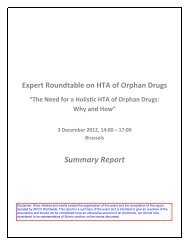7817 Annual Report 2009.qxd - Shire
7817 Annual Report 2009.qxd - Shire
7817 Annual Report 2009.qxd - Shire
Create successful ePaper yourself
Turn your PDF publications into a flip-book with our unique Google optimized e-Paper software.
82 <strong>Shire</strong> plc <strong>Annual</strong> <strong>Report</strong> and Accounts 2009Notes to the consolidated financial statements In millions of US dollars, except where indicated3 CRITICAL ACCOUNTING ESTIMATES continued(ii) Valuation of equity investmentsAt December 31, 2009 the carrying value of the Group’s investments in certain public and private pharmaceutical and biotechnology companiesamounted to $105.7 million, (principally represented by the Group’s available-for-sale investment in Vertex). The carrying values of these investmentsare periodically reviewed for other-than-temporary impairment whenever certain events or circumstances suggest that the carrying value of aninvestment exceeds the fair market value of the investment. Indicators of other-than-temporary impairment considered by the Group, include, inter alia:— the market value of a quoted investment being below the cost of the investment;— adverse news on a company’s progress in scientific technology/development of compounds; and— recent stock issuances at a price below the investment price.If the fair value appears to be below the investment’s cost the Group considers all available evidence in assessing whether there is an other-thantemporaryimpairment. This evidence would include:— the length of time and/or the extent to which the market value of the investee is less than the cost of the investment;— the level of progress in the investee’s scientific technology/development of compounds;— ongoing activity in collaborations with the investee;— whether or not other substantial investee-specific adverse events have occurred which may cause a decline in value;— analysis and valuation of comparable companies; and— the overall financial condition and near term prospects of the investee.In instances when this review indicates that there is an other-than-temporary impairment of the Group’s investment in private companies, the Groupimpairs the investment to its current fair value. For the Group’s investments in public companies which are accounted for as available-for-sale securities,if these investments are deemed to be other-than-temporarily impaired, any unrealized holding loss is reclassified from other comprehensive incomeby recording an other-than-temporary impairment charge in the consolidated statements of operations.During 2009, 2008 and 2007 <strong>Shire</strong> did not record any impairment charges for its non-current investments in private companies. During the yearto December 31, 2009, the Group recorded other-than-temporary impairment charges for its available-for-sale securities of $0.8 million (2008:$58.0 million, 2007: $3.0 million), and at December 31, 2009 the Group has unrealized holding gains on its available-for-sale securities of $15.0 million.At December 31, 2009 the Group does not have any available-for-sale securities with unrealized holding losses.Other-than-temporary impairment charges recorded in 2008 included $44.3 million for the Group’s investment in Renovo Group plc. During the thirdquarter of 2008, the Group considered the following factors in its determination of whether its impairment in Renovo Group plc was temporary or otherthan-temporary:the severity of the decline from historical cost (87% decline) and its duration (11 months); market analysts’ targets of Renovo Groupplc’s share price for the next 18-24 months; and the revised expected filing date for JUVISTA due to the adoption of a sequential rather than parallelPhase 3 development plan. These factors, together with the significant decline in global equity markets during the third quarter of 2008 meant that theGroup was unable to reasonably estimate the period over which a full recovery in the value of its investment in Renovo Group plc could occur. As such,at the end of the third quarter of 2008 the Group concluded that the decline in value was other-than-temporary.The determination of the fair value of private company investments and the determination of whether an unrealized holding loss on a publicly quotedinvestment is other-than-temporary requires significant management judgement. Any future events or circumstances which could lead to therecognition of other–than-temporary impairment charges, particularly in respect of the Group’s investment in Vertex (carrying value at December 31,2009 $74.4 million), could have a material adverse impact on the Group’s financial condition and results of operations.(iii) Sales deductionsSales deductions consist of statutory rebates to state Medicaid and other government agencies, contractual rebates with health-maintenanceorganizations (’HMOs’), product returns, sales discounts (including trade discounts and distribution service fees), wholesaler chargebacks, andallowances for coupon sampling programs. These deductions are recorded as reductions to revenue in the same period as the related sales withestimates of future utilization derived from historical experience adjusted to reflect known changes in the factors that impact such reserves. On thebalance sheet the Group records wholesaler chargebacks and prompt payment discounts as a reserve against accounts receivable, whereas allother sales deductions are recorded within current liabilities.The Group has the following significant categories of sales deductions, all of which involve estimates and judgements which the Group considersto be critical accounting estimates, and require the Group to use information from external sources:Medicaid and Managed Care rebatesStatutory rebates to state Medicaid agencies and contractual rebates to Managed Care Organizations (‘MCO’) under managed care programs arebased on statutory or negotiated discounts to the selling price. Medicaid rebates generally increase as a percentage of the selling price over the lifeof the product (if prices increase faster than inflation).As it can take up to six months for information to reach the Group on actual usage of the Group’s products in managed care and Medicaid programsand on the total rebates to be reimbursed, the Group maintains reserves for amounts payable under these programs relating to sold products.The amount of the reserve is based on historical experience of rebates, the timing of payments, the level of reimbursement claims, changes in prices(both normal selling prices and statutory or negotiated prices), changes in prescription demand patterns, projected product returns and the levelsof inventory in the distribution channel. Adjustments are made for known changes in these factors, such as how shipments of authorized genericADDERALL XR to Teva and Impax should be included in the Medicaid rebate calculation pursuant to Medicaid rebate legislation.<strong>Shire</strong>’s estimates of the level of inventory in the distribution channel are based on product-by-product inventory data provided by wholesalers; resultsof independently commissioned retail inventory surveys and third-party prescription data (such as IMS Health National Prescription Audit data).


